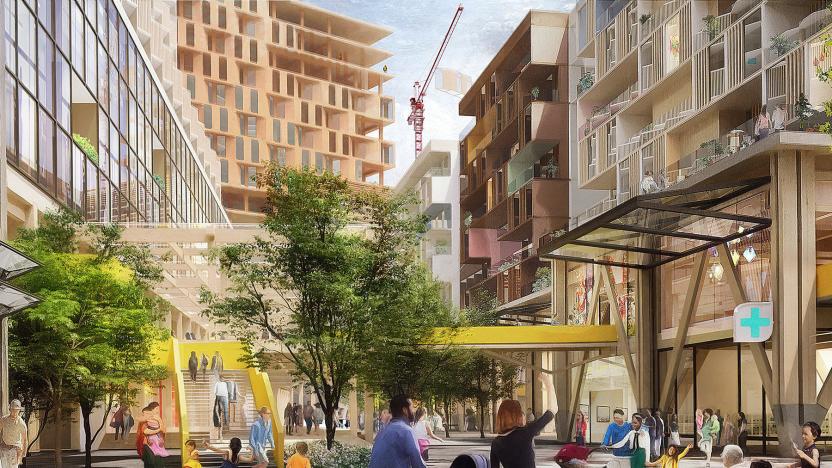smart city
Latest

Sidewalk Labs products will be folded into Google proper
The CEO of the smart city company is stepping down due to health concerns.

Saudi Arabia is planning a 100-mile line of car-free smart communities
Saudi Crown Prince Mohammed bin Salman is promising to build a network of smart cities that won’t have any cars or roads. It’s called The Line, due to its arrangement of ”hyper-connected future communities,” and will form part of NEOM, a $500 billion project announced in October 2017. According to the prince, the development will offer “ultra-high-speed transit,” autonomous vehicles and an urban layout that ensures basic facilities, such as schools and medical clinics, are never more than a five-minute walk away.

Alphabet's Sidewalk Labs abandons its Toronto smart neighborhood project
Waterfront Toronto’s vote on the draft MIDP has been delayed several times.

Key vote on Alphabet's smart neighborhood delayed over coronavirus
Sidewalk Labs, the part of Alphabet focused on smart cities, will have to wait a while longer to find out whether its Quayside project can go ahead. Waterfront Toronto, a tri-government organization spearheading the city's lakeside overhaul, has pushed the deadline for a decisive vote to June 25th. "In view of the COVID-19 pandemic, today the Waterfront Toronto Board of Directors passed a motion to extend the date for a decision on moving forward with the Quayside project with Sidewalk Labs," it said in a tweet.

Toronto rejects some of Sidewalk Labs’ smart neighborhood ideas
Sidewalk Labs will have to cede a little more ground on its vision for Quayside, a planned smart neighborhood in Toronto. The company, which is owned by Google-parent Alphabet, published a draft version of its Master Innovation and Development Plan (MIDP) last June. The technical document, which spans four volumes and almost 1,000 pages, is packed with proposals for how the district should be designed, funded and governed. Waterfront Toronto, a tri-government organization spearheading the city's lakeside overhaul, has now completed a technical evaluation of the draft MIDP, which will help its board decide whether to approve the project or sever ties with Sidewalk Labs entirely.

Toronto is reining in Sidewalk Labs’ smart city dream
Sidewalk Labs, the part of Google-parent Alphabet that's focused on futuristic cities and urban development, has agreed to compromise on a proposed smart neighborhood in Toronto. Back in June, the company submitted a draft MIDP (Master Innovation and Development Plan) for Quayside, an ambitious redevelopment project overseen by Waterfront Toronto. The publicly-funded organization immediately found issues with some of Sidewalk's suggestions, though, that needed to be fixed before it could formally consult and evaluate the plan.

Sidewalk Labs finally publishes its smart city master plan
Better late than never. Sidewalk Labs, the part of Alphabet focused on cities and urban development, has unveiled its Master Innovation and Development Plan (MIDP) for a proposed smart neighborhood on Toronto's Eastern Waterfront. The MIDP is called a "draft," but it's the first official pitch document that sets out the company's vision for the area. It will be scrutinized by Waterfront Toronto, a publicly-funded organization, and ultimately, voted on by its board and the Toronto city council in late 2019 and early 2020. If it goes through, Sidewalk hopes to begin construction on the first part -- a site called Quayside -- before 2021. The company has shared morsels of its smart city vision before. These include the 200-page document that helped it secure the project -- that is, the right to develop the MIDP -- back in October 2017. Since then, Sidewalk Labs has been stuck in a research phase, consulting with experts and gathering public feedback. The team has shared some, but not all of its evolving ideas through a mixture of live events, blog posts, PDF presentations and podcasts. These snippets, it always emphasized, were exploratory and subject-to-change ahead of its all-important MIDP. The document, even in draft form, solidifies the company's thinking. It also gives Toronto residents their clearest picture yet of what a smart neighborhood spearheaded by Sidewalk Labs -- and by extension, Google -- might look like. Below, we've summarized the main features that will likely spark debate in the coming months.

Alphabet's smart neighborhood could have shape-shifting 'superblocks'
Too many cities are built around cars rather than people. Sidewalk Labs, an offshoot of Google's parent company Alphabet, wants its smart neighborhood in Toronto to be different. It's considering a so-called superblock concept, modeled after Barcelona's, that bundles smaller streets together and limits vehicles to the perimeter. The smaller lanes inside each superblock would then become safer, quieter spaces for pedestrians and cyclists. Sidewalk Labs wants to go a step further, though, with real-time traffic monitoring and movable street furniture. These would allow the company to create smart, dynamic superblocks that subtly change with the time of day and needs of its residents.

NHS vehicles trial tech that turns traffic lights green on command
Traffic lights are a pet peeve for many city-dwelling drivers. You'll be running late for a meeting, but all of your attempts to make up the time are thwarted by successive red lights. Bad luck on the road can be particularly problematic for ambulances in the UK -- when they're rushing to the scene of an accident, every second counts. To help out, Newcastle University is spearheading a new project that gives NHS vehicles priority at the lights.

Intel and San Jose's smart city will use real-time data to monitor air quality and more
Today Intel announced a partnership with the city of San Jose, with the goal of improving quality of life through real-time data tracking of air quality, traffic flow and more. The six-month pilot program is Intel's first "smart city" implementation in the US, and it's being presented today as part of the White House SmartAmerica Challenge in Washington, DC.

SmartScreens begin rollout to NYC payphones, City24/7 and Cisco eying expansion to additional cities
Slowly but surely, payphones around New York City are losing their innocence. As planned, City24/7 has started to convert seldom-used booths into LCD-equipped information kiosks, with so-called SmartScreens broadcasting "neighborhood news, current events and entertainment listings, local deals and specials." We're told that multiple mobile apps are being made available via the 32-inch multitouch panels, though as of now, only ten installations have gone live. Over the next several months, the number of installations will increase to up to 250 participating phone booths throughout the five boroughs, and once it's reached saturation in the Big Apple, City24/7 and Cisco are planning to expand into over a dozen other foreign and domestic cities. The SmartScreens are designed to use real-time, location-based services, tied in to the network throughout the city, and moreover, each booth is equipped with gratis WiFi, NFC and Bluetooth capabilities. In other words, they're fit to live in.

North Carolina launches FCC-approved TV White Space network in Wilmington
Back in December, the FCC approved the first white space device and database for the lucky city of Wilmington, North Carolina. Last week, the program bore its first fruits, when database operator Spectrum Bridge finally launched its TV White Space (TVWS) network in Carolina, as part of Wilmington's ongoing "Smart City" initiative. With the TVWS network up and running, Wilmingtonians will have internet access in public parks, while authorities will be able to use part of Spectrum Bridge's broadband for video surveillance. Public security, in fact, is among the primary functions of the new network, which will be expanded to help manage traffic congestion and to help the city function more efficiently. Beam past the break for more, in the full press release.

Microsoft unites with former exec in building a 'smart city' in Portugal
If you want better cities, goes the theory herein, you'll have to start at their very foundations. Steve Lewis, ex-Microsoftie and current CEO of Living PlanIT, has a vision for how to make our cities smarter and more sustainable, and it starts literally at ground level, with the installation of smart sensors into buildings as they're being built. The appeal of his company's ideas has already attracted some tech luminaries as partners, Cisco being among them, and now Microsoft has also been signed up -- to provide the cloud framework required to keep all those sensors talking with its Azure platform. Paredes, a Portuguese municipality, will play host to one of the first such projects, eventually providing homes for nearly a quarter of a million people and costing a staggering €10 billion ($14.1b) to complete. To understand the synergistic benefits of having your life monitored by an omniscient Urban Operating System sentinel, skip past the break for a press release and explanatory video.




